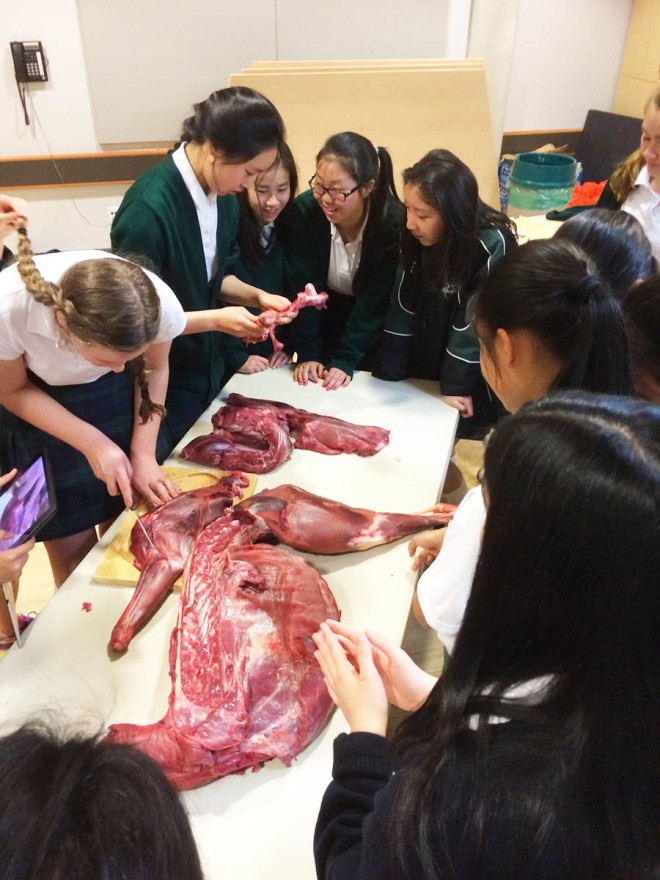
The Grade 7 Primitive Project has allowed Grade 7 Teacher Jason Camp to bring his passion for hunting into the classroom and connect both the Science and Social Studies curriculums.
During lunch hour on April 20th, he skilfully demonstrated how to butcher a deer with Grade 7, 11 and 12 students in attendance. The demonstration allowed Biology 11/12 students to see first-hand what a tendon or fascia looks like. The girls also had the opportunity to see how a deer is divided for consumption. Some of the students were also able to try the butchering process themselves.

“The science of the animal was laid out before them, but they also had respect for the animal and the process,” says Mr. Camp. “This wasn’t a traditional dissection that the students are normally used to.” The end result was food for Mr. Camp’s family and friends.
The Grade 7 Primitive Project began in the fall of 2011 when Mr. Camp first brought his venison jerky into the classroom for the Grade 7s to try. In November of 2012, he had them making it. The following year, he kept the hide from a deer that he had harvested on Pender Island with Chris Britt, Sr. School Science Teacher and Outdoor Ed Coordinator. Mr. Camp asked the Grade 7s if they were interested in seeing the hide and learning how to turn it into buckskin.
The Primitive Project ties in both the Science curriculum and Social Studies (Ancient Civilizations) curriculum together very nicely. The class has had some great discussions on the ethics of eating meat and what it means to be a respectful omnivore. “I make sure to include my vegetarians into the discussion and I put them on a bit of a pedestal saying that they are removed, either by choice or by religion, from this dilemma,” says Mr. Camp.

Next year, Mr. Camp wants to take the Primitive Project a little further by condensing the whole project into the first term. His plan is for the Grade 7s to learn how to create from scratch a bow drill friction fire, practice trying to make fires with that kit, preserve meat by creating venison jerky, learn how to take a hide from a raw state to buckskin and make something with it. “The goal is to have them appreciate what all cultures have done for the first 190,000 of the past 200,000 years.”
“Parents have been very supportive of this project and I try to be a gentle and respectful of everyone involved,” he says. “The truth is that I create way more vegetarians out of this process than hunters, as the students, many for the first time, start to think about where the meat they see wrapped up neatly on grocery store shelves comes from.”
Mr. Camp became certified hunter in 2008. But his path to hunting began in his early teens. “My father asked me what I thought about hunting and I told him that it seemed pretty cruel,” he says. “He then asked me what I thought about raising animals to be slaughtered on a farm, and I told him that it was okay because that was their purpose. I then thought about what I had said and realized that it didn’t sit well with me ethically.”
He harvested his first buck in the fall of 2009, and has been hunting every year since. “I really enjoy my time in the woods hunting, but the feeling of responsibility has never left me,” he says. “I only hunt with others who are ethical. I butcher my own deer, making sure to do everything right so that the meat of the animal feeds my family, and did not die in vain.”

